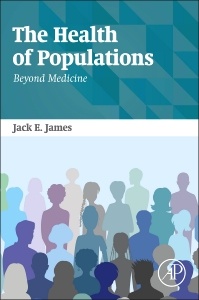Description
The Health of Populations
Beyond Medicine
Authors: James Jack, James Jack
Language: English
Subjects for The Health of Populations:
57.30 €
In Print (Delivery period: 14 days).
Add to cartSupport: Print on demand
Description
/li>Contents
/li>Readership
/li>Biography
/li>Comment
/li>
The Health of Populations: Beyond Medicine uses current research and in-depth analysis to provide insights into the issues and challenges of population health; a subject of increasing concern, due largely to rapid population growth, population aging, rising costs and diminishing resources, health inequality, and the global rise in noncommunicable diseases. Reducing the global burden of disease requires prevention of disease incidence, which is achievable through reduction of exposure to primary (behavioral) and secondary (biomedical) risk factors. The 15 chapters of the book are divided into three sections that focus on the science of health, the harm of medicine, and how to achieve optimal health. By highlighting the benefits of preventing incidence of disease, this book illustrates how biomedicine needs to be repositioned form being the dominant approach in healthcare to being an adjunct to behavioral, legislative, social, and other preventive means for optimizing population health.
Part 1: The Science of Health1. The Origins of Health2. Current Patterns of Death and Disease3. Twelve Millennia of Changing Human Habits and Habitats4. Biomedicine and Common Causes of Mortality and Morbidity
Part 2: The Harm of Medicine5. Medical Harm: What Is It and What Is the Extent?6. Prescription Drugs, Surgery, and Infections7. The Commercial Culture of Medicine8. Pharmaceutical Industry Entanglement with Biomedical Science9. The Charms and Harms of Personalized Medicine
Part 3: Achieving Optimal Health Sustainability10. Healing Practices and Evidence-based Medicine11. Placebo and the Therapeutic Process12. Prevention and Control of Disease13. Associated Prevention Concepts and Models14. Optimal Health: Risk Factor Reduction and Adjunctive Biomedical Intervention15. Mental Health
Professionals and graduate students in public health, epidemiology, sociology, health science, health promotion, health education, preventative medicine, health policy and planning, and health psychology. In addition, this book will be greatly welcomed by the interested general reader.
- Heavily evidence-based and thoroughly referenced with hundreds of scientific citations
- Contains a glossary, as well as valuable tables, illustrations, and information boxes to further explain core content
- Provides fresh perspectives on issues related to rapid population growth, population aging, rising costs, diminishing resources, health inequality, and more
- Carefully distils extensive tracts of information, clarifies misunderstandings, and rebuts myths with the ultimate goal of encouraging better understanding of the action needed to promote optimal health for all




